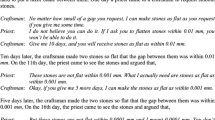Abstract
At a highly technical institution, this interdisciplinary problem-solving course was designed for students who had been placed on probation or suspended. Two professors, with divergent backgrounds in mathematics and literature, collaborated in the research, planning and teaching. The course stresses the cross-disciplinary applications of “tools” such as analogy, using a variety of assignments in mathematics, logic and literature. The importance of both “ill-structured” and “well-structured problems” is discussed, as is the rationale for including oral presentations, group problems, and a formal debate in the curriculum. The article emphasizes the value of cross-disciplinary collaboration for studentsand faculty, as it presents an approach to teaching reasoning skills that could be applied to a variety of academic settings.
Similar content being viewed by others
References
Brightman, Harvey J. (1980).Problem solving: A logical and creative approach. Atlanta: Georgia State University.
Buchanan, Scott (1962).Poetry and mathematics. Chicago: University of Chicago Press.
Cooley, Thomas, (Ed.). (1979).The Norton sampler: Short essays for composition. New York: W.W. Norton and Co. With permission of the American Anthropological Association (1956) fromThe American Anthropologist, 58, (3).
Davis, Samuel W. (1984). Tuesday night dead: A ‘whodunit’ logic puzzle.Games, 49.
Dewey, John (1910).How We Think. Boston: D.C. Heath Co.
Frederiksen, Norman (1984). Implications of cognitive theory for instruction in problem solving.Review of Educational Research, 54, (3), 363–407.
Greenes, Carole, Gregory, John, & Seymour, Dale (1977).Successful problem solving techniques. Palo Alto: Creative Publications.
Hayes, John R. (1981).The complete problem solver. Philadelphia: The Franklin Press.
Kennedy, X.J. (Ed.). (1979).Literature (second ed.). Boston: Little Brown, & Co.
Kruger, Arthur N. (1960).Modern debate: Its logic and strategy. New York: McGraw-Hill Book Co., Inc.
Lakotos, Inre (1976).Proofs and refutations: The logic of mathematical discovery. Worrall, John & Zahar, Elie (Ed.). Cambridge: Cambridge University Press.
McCarthy, Virginia (1984). A circle of friends.Games, 10.
McCuen, Jo Ray & Winkler, Anthony C. (Eds.). (1977).Readings for writers, (second ed.). New York: Harcourt, Brace, Jovanovich.
Polya, G. (1945).How to solve it: A new aspect of mathematical method. (second ed.) Princeton: Princeton University Press.
Rubinstein, Moshe F. (1975).Patterns of problem solving. Englewood Cliffs, NJ: Prentice Hall, Inc.
Young, Robert E., (Ed.) (1980).Fostering critical thinking. InNew directions for teaching and learning, San Francisco; Jossey-Bass, Inc.
Author information
Authors and Affiliations
Additional information
She is currently Chairman of the Reading and Writing Department of the Learning Development Center at Rochester Institute of Technology where she also teaches courses in the College of Liberal Arts. She has given professional presentations on teaching interdisciplinary problem solving, using student research to examine ethical issues, and implementing writing across the curriculum. She has also reviewed several contemporary novels and written on the fiction of Henry James.
She is currently an assistant professor in the Mathematics Department of the College of Science at Rochester Institute of Technology. She has given numerous presentations at regional and national conferences on interdisciplinary problem solving, mathematical problem solving, using writing to teach mathematics, art and mathematics, and math anxiety. She is Past-President of the New York College Learning Skills Association and a 1983 recipient of the Eisenhart Award for Outstanding Teaching at Rochester Institute of Technology.
Rights and permissions
About this article
Cite this article
Coon, A.C., Birken, M. The common denominators: A collaborative approach to teaching reasoning skills through literature and mathematics. Innov High Educ 12, 91–100 (1988). https://doi.org/10.1007/BF00889605
Issue Date:
DOI: https://doi.org/10.1007/BF00889605




